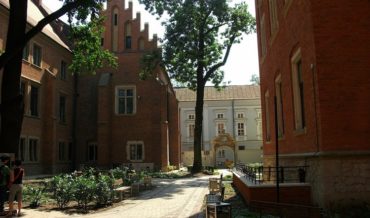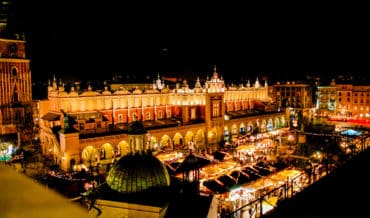Contents
Key Facts
- Born in Stanisławów (modern-day Ivano-Frankivsk, Ukraine) in 1821, died in Kraków in 1907
- Distinguished economist and politician who played a crucial role in Austrian financial policy
- Three-time Rector of the Jagiellonian University in Kraków (1861-1862, 1875-1876, 1882-1883)
- Minister of Finance of Austria (1880-1891) during a critical period of the empire's economic development
- Decorated with highest honors: Grand Cross of the Order of St. Stephen and Great Ribbon of the Order of Leopold
- Multilingual academic career spanning universities in Lviv, Vienna, Kraków, and Bratislava
- Renowned for exceptional oratory skills and comprehensive economic expertise
Early Life and Education
Julian Dunajewski was born in Stanisławów (now Ivano-Frankivsk, Ukraine) in 1821, a city that was then part of the Austrian Empire's Kingdom of Galicia and Lodomeria. His birthplace, located in the culturally diverse region of Galicia, provided him with early exposure to the complex political and economic challenges that would later define his career.
Until 1842, he pursued his studies in economics at two prestigious institutions: the University of Lviv and the University of Vienna. This dual educational experience was instrumental in shaping his comprehensive understanding of both regional and imperial economic systems. The University of Vienna, in particular, was renowned for its advanced economic theories and provided Dunajewski with exposure to the latest developments in political economy and statistical analysis.
Academic Career at Jagiellonian University
Early Academic Positions
Dunajewski's connection with Kraków began when he worked as an assistant at the Department of Political Skills and Statistics at the Jagiellonian University. This position allowed him to develop his expertise in statistical analysis and political economy, fields that were becoming increasingly important in the modernizing Austrian Empire.
Doctoral Achievement and Professorship
In 1850, he obtained his doctorate in law at the Jagiellonian University, marking a significant milestone in his academic career. Following his doctoral achievement, he became a professor of political economy and statistics at the same institution, where his exceptional teaching abilities and scholarly contributions quickly gained recognition.
Leadership as Rector
Dunajewski's academic excellence and administrative capabilities led to his appointment as Rector of the Jagiellonian University on three separate occasions (1861-1862, 1875-1876, and 1882-1883). This unprecedented achievement demonstrated the high regard in which he was held by both his academic peers and the university administration. As Rector, he played a crucial role in:
- Modernizing the university's curriculum to include contemporary economic theories and statistical methods
- Strengthening the Faculty of Law and Administration through new faculty appointments
- Promoting research in economics and political sciences
- Enhancing the university's reputation throughout the Austrian Empire and beyond
Broader Academic Influence
International Teaching Career
Beyond his work in Kraków, Dunajewski's expertise was sought after by other prestigious institutions. He became a professor at the Academy of Law in Bratislava (then Pressburg), where he contributed to legal education in the Hungarian part of the Austrian Empire. Subsequently, he also taught in Lviv, returning to one of his alma maters to share his accumulated knowledge and experience.
Scholarly Contributions
Dunajewski was recognized as an outstanding lecturer and excellent speaker, qualities that made him highly effective in both academic and political settings. His reputation extended far beyond the classroom, as he was the author of numerous scientific papers that contributed significantly to the fields of economics, political science, and public administration.
His scholarly works addressed various aspects of:
- Public finance and budgetary policy
- Statistical methodology in economic analysis
- Currency and monetary policy within the Austrian Empire
- Legal frameworks for economic development
- Tax system reforms and fiscal administration
Political Career
Parliamentary Service
Dunajewski's expertise in economics and his exceptional communication skills naturally led him into politics. He became a member of the Galician Diet and later served in the Austrian Imperial Council (Reichsrat), where he advocated for policies that would benefit both Polish interests and the broader Austrian Empire. His parliamentary work focused on economic legislation and financial reform, demonstrating the kind of effective political leadership in Kraków that characterized the region during this period.
Minister of Finance of Austria
The pinnacle of Dunajewski's political career came with his appointment as Minister of Finance of Austria from 1880 to 1891. During his eleven-year tenure, one of the longest in the history of the Austrian Ministry of Finance, he was responsible for:
- Implementing the currency reform of 1892 (prepared during his tenure), establishing the Austrian crown as the new currency
- Modernizing the empire's tax collection system and improving fiscal administration
- Balancing the imperial budget through systematic financial reforms
- Negotiating the Austro-Hungarian Compromise financial agreements of 1887
- Overseeing infrastructure investment, including railway expansion financing
His tenure as Finance Minister was marked by significant achievements, including the stabilization of Austrian state finances and the preparation of comprehensive monetary reforms that modernized the empire's financial system.
Recognition and Honors
Dunajewski's exceptional service to the Austrian Empire was formally recognized through prestigious decorations:
Imperial Orders
-
Grand Cross of the Order of St. Stephen of Hungary: This highest civilian decoration of Hungary recognized his outstanding contributions to the empire's administration and his role in strengthening Hungarian-Austrian financial relations.
-
Grand Cross of the Order of Leopold: This distinguished Austrian order acknowledged his exceptional service to the empire and his contributions to economic development and public administration.
These honors reflected not only his professional achievements but also his ability to navigate the complex political landscape of the multi-ethnic Austrian Empire while maintaining respect from various constituencies.
Legacy and Connection to Kraków
Julian Dunajewski died in Kraków in 1907, the city where he had spent much of his academic career and made his most significant contributions to higher education. His death in historic Kraków symbolized his deep connection to the city and the Jagiellonian University that had been central to his life's work.
His legacy in Kraków includes:
- Establishment of modern economic education at the Jagiellonian University through curriculum reforms
- Integration of practical political experience with academic theory in his teaching methodology
- Mentorship of future economists and political leaders who would serve in various capacities throughout the empire
- Enhancement of Kraków's reputation as a center of economic learning and political thought
Dunajewski's life exemplified the career path of a distinguished 19th-century Central European intellectual who successfully combined academic excellence with practical political service. His contributions to Austrian financial policy, particularly the currency reform preparations and fiscal modernization, had lasting impacts on the empire's economic development. His work at the Jagiellonian University helped establish Kraków as an important center for economic education in Central Europe, contributing to Kraków's historical development as a major intellectual hub.
As one of the most distinguished academics and politicians of his era, Dunajewski exemplified the intellectual tradition that connected Polish royal heritage with modern administrative excellence. His career placed him among the ranks of famous Polish figures who shaped both national and international policy during the Habsburg era.
The cultural and educational environment of Kraków during his lifetime, enriched by institutions such as the National Museum and the vibrant university quarter, provided the perfect setting for his scholarly pursuits. His work contributed to the intellectual prestige of the broader Małopolska region and established lasting connections between academic theory and practical governance.
References and Sources
This article is based on documented historical records from the Austrian State Archives, the Jagiellonian University Archives, and entries in the Österreichisches Biographisches Lexikon and Polski Słownik Biograficzny. Parliamentary records from the Austrian Imperial Council and official ministerial documents provide verification of his political appointments and achievements.


